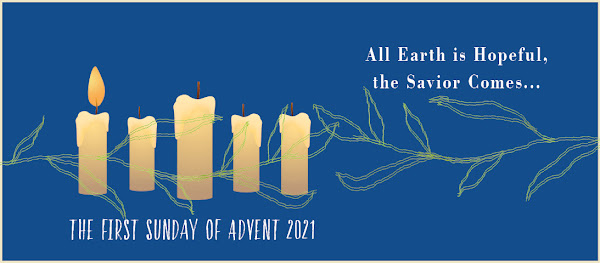Advent Family Prayer
God of Love,
Your son, Jesus, is your greatest gift to us.
He is a sign of your love.
Help us walk in that love during the weeks of Advent,
As we wait and prepare for his coming.
We pray in the name of Jesus, our Savior.
Author unknown; from Xavier University, Cincinnati: Jesuit Resources–check them out!
Advent
On the first Sunday of Advent the church begins a new year of grace. Happy New Year!
From the Latin Ad + Venire, Towards Coming of Jesus, every lectionary year Advent opens with a splash of apocalyptic, signaling the end of the world as we know it, the beginning of a new way of living and being—the world is about to turn. Many churches sing Canticle of the Turning that's based on Mary's Magnificat at least once during Advent.
Blue, the color of hope, has become the official color for Advent. Advent is especially about hope, although it also includes a theme of repentance. In Spanish esperar/espero means wait, hope, and expect. We hope for and anticipate not a Merry Christmas or Happy Holidays as the rest of the world sincerely wishes us; we hope for the incarnation of mercy, grace, and love. Instead of the rest of the world's irenic peace that's not much more than a temporary cease fire, we hope for, wait for, and expect the fullness of shalom the Prince of Peace brings us. We hope for the dawn of the new creation the death and resurrection of the Prince of Peace will initiate. Advent light shines amidst all kinds of darkness, including a seemingly endless pandemic, injustices that don't or won't quit, an earth that grieves its own losses. Come, Lord Jesus!
The Gospel According to Saint Luke
This is Revised Common Lectionary Year C, Luke's year. Luke is a synoptic gospel that views Jesus' life and ministry in a similar manner to Matthew and Mark. Luke is the only Gentile, non-Jewish writer in the entire New Testament. Luke was a highly educated physician, but think "bronze age" in terms of sophistication. Luke wrote a two-volume account consisting of this gospel and the Acts of the Apostles. Luke's distinctives:
• world history and Jewish history
• Jesus' genealogy in Luke ends with "Adam, son of God."
• the Holy Spirit has been prominent throughout scripture's witness, but Luke-Acts brings a fulfillment of God's reign in the Spirit
• prayer
• women
• marginalized people of every class and type, the underclass
• table fellowship
• neighborology: the word about the neighbor! During Year C the lectionary has quite a few readings from Jeremiah and Deuteronomy that also emphasize the neighbor, the other, living together faithfully in covenantal community despite differences.
• Starting with John the Baptist counseling people to share what they have with others in order to prepare for the arrival of God in their midst, we find a lot of "social gospel" in Luke. However, this isn't let's see how many good works we humans can accomplish on our own; it's always about the indwelling and outgoing power of the Holy Spirit.
Luke includes three psalm-like songs or canticles based on Old Testament sources:
• Mary's Magnificat, "My soul magnifies the Lord; he has put down the mighty from their thrones and lifted up the lowly…" – Luke 1:46-55
• Zechariah's Benedictus, "Blessed be the Lord God of Israel; he has visited his people." This is John the Baptist's father Zechariah—not the one from the OT Book of the Twelve or Minor Prophets. – Luke 1:67-79
• Simeon's Nunc Dimittis: "Lord, now let thy servant depart in peace; mine eyes have seen they salvation, which thou hast prepared…" – Luke 2:29-32
Uniquely in Luke:
• Sermon on the Plain – Luke 6:17-49, which emphasizes re-distributive justice and material well-being. Matthew's parallel Sermon on the Mount is more about spiritual well-being.
• Good Samaritan – Luke 10:25-37
• Prodigal Son – Luke 15: 11-32
• Stones cry out Luke – 19:37-40
• Emmaus Road in Luke's post-resurrection account takes us back to the Maundy Thursday Upper Room and to Luke's many accounts of Jesus' table fellowship with all comers – Luke 24:13-35
The Gospel for Advent 1C
Rather than coming from the beginning of Luke's gospel, in the gospel reading for this first Sunday of Advent Jesus speaks toward the end of his public ministry. We hear about signs and symbols coming alive in nature/creation; we'll soon celebrate the birth of Jesus who is not a god in nature, but God and Lord of nature. Look at creation; consider what's not manufactured or engineered.
Luke 21:25-28
25"There will be signs in the sun, the moon, and the stars, and on the earth distress among nations confused by the roaring of the sea and the waves. 26People will faint from fear and foreboding of what is coming upon the world, for the powers of the heavens will be shaken. 27Then they will see the Son of Man coming in a cloud with power and great glory. 28Now when these things begin to take place, stand up and raise your heads, because your redemption is drawing near."
